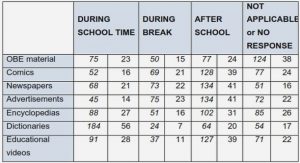Get Complete Project Material File(s) Now! »
Loci of this study
“What then? Are we better than they? Not at all; for I have already charged that both Jews and Greeks are all under sin…(Τί οὖν; προεχόμεθα; οὐ πάντως· προῃτιασάμεθα γὰρ Ἰουδαίους τε καὶ Ἕλληνας πάντας ὑφ᾽ ἁμαρτίαν εἶναι…)”1 Paul the Apostle made a declarative claim in Rom 3:9 before he employed the catena of quotations from the Jewish Scriptures in Rom 3:10-18. In doing so, Paul set the stage for making sense of his famous theologoumenon, that is, “the Justification of the ungodly” in Romans 4.2 Briefly put, it stands to reason that a notion of the universality of sin over humanity in toto goes hand in hand with God’s salvific economy in the course of salvation history. Hence Carson (2013:22, italics original) is correct in saying that “[t]here can be no agreement as to what salvation is unless there is agreement as to that from which salvation rescues us.” Unfortunately, however, there has been no scholarly agreement as to what God’s salvific economy in the course of salvation history is about, especially in relation to sin.
Status Quaestionis
Since Moo’s (1987:306) observation almost four decades ago that “[m]any of us Neutestamentler feel that Sanders’s proposal fails to do justice to some important elements in both Paul and Judaism, yet feel incompetent to explore the mass of Jewish material. We eagerly await the work of the next generation of scholarship on Judaism,”3 we are now better poised to approach Second Temple Judaism and assess whether or not it is correct that “[it] is a matter of observation that all men sin” other than of the universality of sin over humanity in toto (Sanders 1977:125).
Concluding remarks
Both Hultgren’s (2007) and Rosen-Zvi’s (2011) studies demonstrate that the universality of sin over humanity in toto should not be easily dismissed as a rhetorical expression compared to the sublimity of God when one attempts to establish the pattern of religion of Second Temple Judaism (pace Sanders 1977). Although one’s awareness of sinfulness and unworthiness before God may not come to the forefront in their dealings with various communal issues, its significance lies in the fact that the Qumran covenanters should take it into account when they attempted to substantiate a concept of the righteousness of God or make sense of dualism/ dualistic ways of thinking of the Qumran community. This dialogue between Sanders and both Hultgren and Rosen-Zvi (albeit arranged according to this researcher) can set a further stage for this study. This is because this study is aimed at delving into various stances of Jewish authors of the Second Temple period concerning the universality of sin over humanity in toto. As a result, we can be better poised to deal
with our Leitfrage that how Jewish authors of the Second Temple period29 would answer the question as to whether one becomes a sinner because he/she sins or one sins because he/she is asinner born with a sinful nature.
Conclusion
Sanders (1977:114) contends that “[s]in comes only when man actually disobeys; if he were not to disobey he would not be a sinner.” This study was thus motivated to critique Sanders’s contention in relation to sin and human accountability in Second Temple Judaism. The Leitfrage of this study has been proposed as the following: “How would Jewish authors of the Second Temple period answer the question as to whether one becomes a sinner because he/she sins or one sins because he/she is a sinner born with a sinful nature?” In an attempt to deal with this Leitgrage satisfactorily, this study was aimed at delving into various understandings of sin and human accountability in 1 Enoch,
Jubilees, Qumran literature, 4 Ezra, 2 Baruch, and the New Testament writings such as Romans and James.
Acknowledgements
Chapter 1. Introduction
1.Loci of this study: universality of sin over humanity in toto
2.Status Quaestionis
3.Sanders and the universality of sin over humanity in toto
3.1. Sanders’s approach to Rabbinic religion
3.2. Yetzer Hara in Sifre
3.3. Sanders’s approach to 1QHa and 1QS
3.4. Universality of sin over humanity in toto in 1QHa and 1QS
3.5. Yetzer in 1QHa
3.6. Concluding remarks
4. Outline of this study
Chapter 2. The Weltanschauung of Second Temple Judaism
1. Preliminary remarks
2.Deuteronomy 31—32 as a framework of history
3. Song of Moses in Second Temple Judaism
3.1. Qumran literature
3.2. Tobit.
3.3. Testament of Moses
3.4. Philo
3.5. Josephus
3.6. Sifre Deuteronomy
4. Genesis 1—3 as a framework of theological anthropology
4.1. Genesis 1—3 in Ben Sira
4.2. Genesis 1—3 in 4QInstruction
Time in Second Temple Judaism
5.1. Ben Sira
5.2. Jubilees
5.3. The Animal Apocalypse
6. Concluding remarks
Chapter 3. Sin and human accountability in 1 Enoch and Jubilees
1.Preliminary remarks
2.The Book of the Watchers in 1 Enoch
2.1. 1 Enoch 1—5
2.2. 1 Enoch 6—11
2.3. 1 Enoch 12—16
2.4. 1 Enoch 17—36
3. The Dream Visions and the Epistle of Enoch
4. Jubilees
5. Concluding remarks
Chapter 4. Sin and human accountability in Qumran literature
1. Preliminary remarks
2. The Watcher story at Qumran
2.1. 1QapGen ar
2.2. 4Q180
2.3. 4Q510—511
2.4. 4Q444
2.5. 11Q11
3. Yetzer Ra in pre-sectarian poetic texts
3.1. 11Q5
3.2. 4Q213a
3.3. 4Q436
3.4. 4Q504—506
3.5. 4Q393
4. Yetzer Ra in sectarian poetic and covenantal texts
4.1. The Hodayot
4.2. The Rule of the Community
4.3. The Damascus Document
Belial at Qumran
Concluding remarks
Chapter 5. Sin and human accountability in 4 Ezra, 2 Baruch, Romans, and James
1. Preliminary remarks
2. 4 Ezra
3.2 Baruch
4. Romans
5. James
6. Concluding remarks
Chapter 6. Conclusion
GET THE COMPLETE PROJECT
SIN AND HUMAN ACCOUNTABILITY IN SECOND TEMPLE JUDAISM





